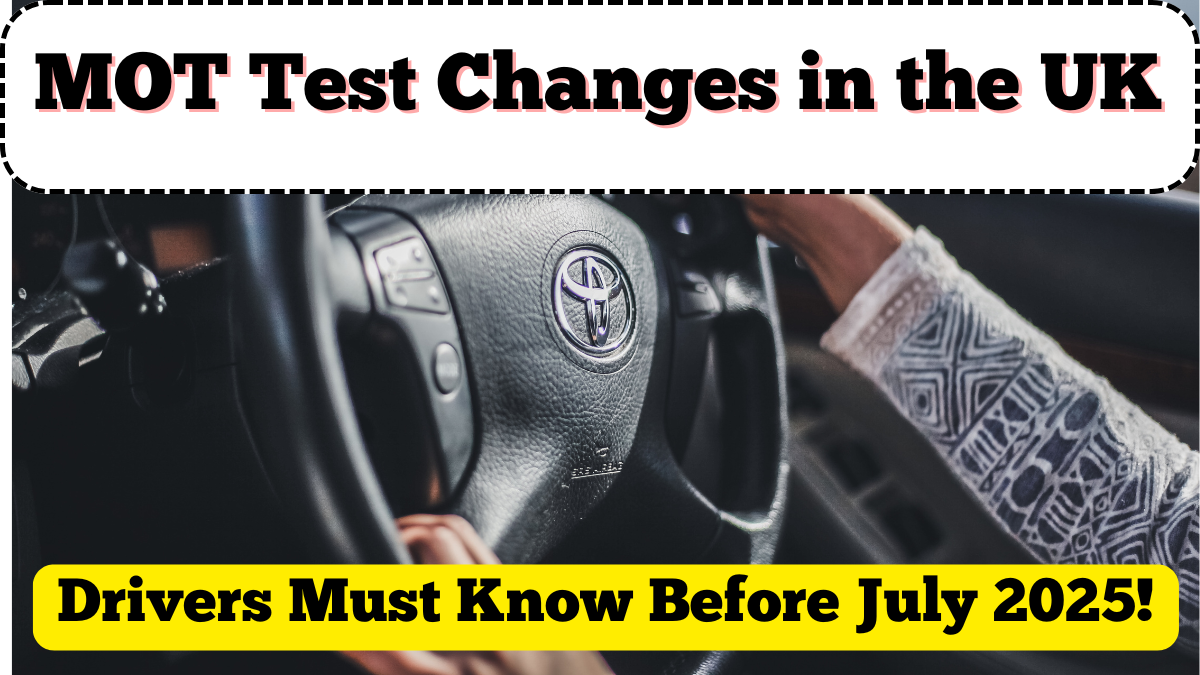The UK government has officially confirmed that new driving laws under the MOT framework will take effect from July 2025. The DVSA (Driver and Vehicle Standards Agency) has introduced a wave of changes to improve road safety, vehicle standards, and emissions monitoring. For drivers across the UK, these changes are not just regulatory—they’re a practical shift in how cars are tested, approved, and kept road-legal.
If you’re a vehicle owner, it’s critical to understand what’s changing and how it will impact your yearly MOT test. Ignoring these updates can lead to failed tests, heavy fines, or even your vehicle being banned from the road. This guide outlines all the critical aspects of the revised MOT test and what actions UK drivers should take now.

What Are the Key MOT Changes Starting July 2025?
Here’s a breakdown of the primary updates included in the new driving laws from July:
-
Advanced Emission Checks: Vehicles must pass stricter emission thresholds, especially diesel and petrol cars registered before 2016.
-
ADAS Calibration: If your car has Advanced Driver Assistance Systems (like lane assist or auto braking), it must be calibrated and fully functional.
-
Tyre Pressure Monitoring: Any fault in tyre pressure monitoring systems will now result in an MOT failure.
-
Brake Test Standards: Brake testing will now include heat resistance and digital readouts for newer vehicles.
What This Means for Vehicle Owners
UK vehicle owners are urged to take pre-emptive checks seriously before their next MOT appointment. Here’s what to do:
-
Book a pre-MOT inspection to identify any likely failures.
-
Get your emission levels checked in advance—especially if your car is older.
-
Ensure dashboard alerts like tyre pressure, check engine, and ADAS system lights are not illuminated.
-
Use certified garages that are updated with the DVSA regulations under the new MOT guidelines.
These updates to the MOT test will not only ensure safer roads but also promote cleaner air and better vehicle performance.
How to Stay Compliant with the New Rules
Adapting to these new driving laws is easy with proper preparation:
-
Always maintain a vehicle service schedule, especially for older cars.
-
Replace faulty sensors immediately—emission and tyre sensors are now MOT critical.
-
Download the DVSA app or sign up for SMS alerts to be reminded of MOT test dates and requirements.
-
Choose certified mechanics familiar with the July 2025 MOT test updates.
A little preventive action now can save you from re-testing charges or temporary vehicle suspension.
Why the DVSA Introduced These Changes
The DVSA introduced these revisions to:
-
Improve road safety and vehicle control with stricter inspection criteria.
-
Reduce environmental damage through tighter emission limits.
-
Adapt to modern vehicles that include more electronic safety systems.
These DVSA regulations align with the UK’s clean air targets and road fatality reduction plans.
Final Checklist for MOT Readiness
Here’s a final checklist UK drivers should go through before July:
| MOT Component | Updated Requirement | Action Required |
|---|---|---|
| Emissions | Stricter levels for older vehicles | Get a professional emission check |
| ADAS Systems | Must be functional and calibrated | Visit a certified ADAS technician |
| Tyre Monitoring | Faults now lead to MOT failure | Ensure no warning lights on dashboard |
| Brake Testing | Advanced digital testing required | Service brakes, especially ABS units |
Staying ahead of these new driving laws ensures your MOT experience in 2025 is smooth and stress-free.
FAQs
What are the most significant MOT changes in July 2025?
The MOT test now includes stricter emission checks, mandatory functioning of ADAS systems, updated brake tests, and compulsory tyre pressure monitoring.
Will older cars have a harder time passing the MOT?
Yes, vehicles registered before 2016 may struggle with the new emission standards and electronic safety checks unless properly maintained.
Is the MOT testing cost going up in 2025?
As of now, no cost hike has been officially announced, but service charges may rise due to the need for more advanced testing.
Can I be fined if I fail the updated MOT test?
Yes, driving without a valid MOT certificate under the updated DVSA regulations can result in fines up to £1,000 and penalty points.
How can I prepare my car for the MOT test under new rules?
Schedule a pre-MOT check, fix all dashboard alerts, and ensure ADAS, tyres, and emissions systems are in good condition.
Click here to know more.
